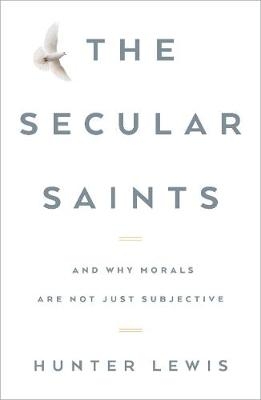
The Secular Saints
And Why Morals Are Not Just Subjective
Seiten
2018
Axios Press (Verlag)
978-1-60419-118-9 (ISBN)
Axios Press (Verlag)
978-1-60419-118-9 (ISBN)
- Titel z.Zt. nicht lieferbar
- Portofrei ab CHF 40
- Auch auf Rechnung
- Artikel merken
This book provides "brief lives" and thoughts of some leading candidates for the term secular saint. All of them have much to teach us about how we lead our lives and think about the fundamental questions we all face. This book also offers a conclusion: that morals and ethics are not just subjective, that they are grounded in very objective realities.
The term "secular saint" may immediately raise questions or even objections. Each religion specifies grounds for being considered a saint. What does it mean to be a secular saint? Presumably an exemplary life. But exemplary based on what? Exemplary according to whom? Perhaps an exemplary life is not even enough to qualify. Perhaps the life must also be inspiring or have something to teach us. But, again, inspiring or instructive according to whom? These questions are variants of the perennial question: are ethics and moral objective in some way or completely subjective? Is anybody's opinion worth hearing? Most people would agree that Hitler's morals were horrendous. But is there a way to distinguish good from bad without reliance on revealed religion? All of this in turn leads to questions humans have always asked themselves. What is right or wrong? What is good or bad or just less good? What is just or unjust? These are not just questions for confused or searching teenagers. Human beings are guided day by day by our beliefs and values, and are absolutely lost without this kind of guidance. This book provides "brief lives" and thoughts of some leading candidates for the term secular saint. Many of them are famous moral philosophers. Taken together, they offer a kind of history of moral thought. Some of them are not what we would today consider philosophers. All of them have much to teach us about how we lead our lives and think about the fundamental questions. This book also offers a conclusion: that morals and ethics are not just subjective, that they are grounded in very objective realities. There is such a thing as right and wrong, better and worse, and as thinking creatures we should recognize this and act on it.
The term "secular saint" may immediately raise questions or even objections. Each religion specifies grounds for being considered a saint. What does it mean to be a secular saint? Presumably an exemplary life. But exemplary based on what? Exemplary according to whom? Perhaps an exemplary life is not even enough to qualify. Perhaps the life must also be inspiring or have something to teach us. But, again, inspiring or instructive according to whom? These questions are variants of the perennial question: are ethics and moral objective in some way or completely subjective? Is anybody's opinion worth hearing? Most people would agree that Hitler's morals were horrendous. But is there a way to distinguish good from bad without reliance on revealed religion? All of this in turn leads to questions humans have always asked themselves. What is right or wrong? What is good or bad or just less good? What is just or unjust? These are not just questions for confused or searching teenagers. Human beings are guided day by day by our beliefs and values, and are absolutely lost without this kind of guidance. This book provides "brief lives" and thoughts of some leading candidates for the term secular saint. Many of them are famous moral philosophers. Taken together, they offer a kind of history of moral thought. Some of them are not what we would today consider philosophers. All of them have much to teach us about how we lead our lives and think about the fundamental questions. This book also offers a conclusion: that morals and ethics are not just subjective, that they are grounded in very objective realities. There is such a thing as right and wrong, better and worse, and as thinking creatures we should recognize this and act on it.
Hunter Lewis is co-founder and former CEO of global investment firm Cambridge Associates, LLC and author of 12 books on economics and moral philosophy. He has contributed to the New York Times, the Times of London, the Washington Post, and the Atlantic Monthly, as well as numerous websites such as Forbes.com, RealClearMarkets.com, and many others. He has served on boards and committees of fifteen leading not-for-profit organizations, including environmental, teaching, research, and cultural and global development organizations, as well as the World Bank.
| Erscheinungsdatum | 16.02.2018 |
|---|---|
| Verlagsort | New York, NY |
| Sprache | englisch |
| Themenwelt | Geisteswissenschaften ► Philosophie ► Ethik |
| Geisteswissenschaften ► Philosophie ► Logik | |
| ISBN-10 | 1-60419-118-X / 160419118X |
| ISBN-13 | 978-1-60419-118-9 / 9781604191189 |
| Zustand | Neuware |
| Haben Sie eine Frage zum Produkt? |
Mehr entdecken
aus dem Bereich
aus dem Bereich
unsere kollektive Verantwortung
Buch | Hardcover (2023)
wbg Theiss in Wissenschaftliche Buchgesellschaft (WBG) (Verlag)
CHF 46,90


